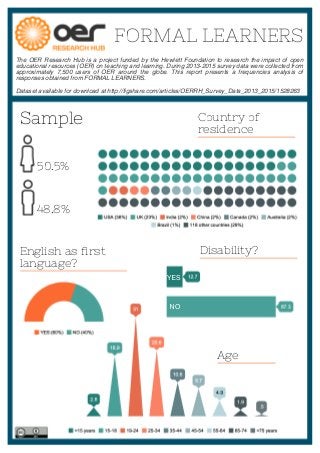
OERRH Data Report 2013-2015: Formal Learners
- 1. FORMAL LEARNERS Sample 50.5% 48.8% Age English as first language? Country of residence NO YES Disability? The OER Research Hub is a project funded by the Hewlett Foundation to research the impact of open educational resources (OER) on teaching and learning. During 2013-2015 survey data were collected from approximately 7,500 users of OER around the globe. This report presents a frequencies analysis of responses obtained from FORMAL LEARNERS. Dataset available for download at http://figshare.com/articles/OERRH_Survey_Data_2013_2015/1528263
- 2. Decision to use OER Which of the following factors influenced your decision to use OER? N=969 The opportunity to study at reduced or no cost The chance to try university-level content The materials can be used flexibly The materials can be accessed any time The materials can be studied online A desire to have a learning experience/study a course A need to find information From informal to formal Did you study your subject via [OpenLearn] before joining your course? N=955 Did your use of [OpenLearn] influence your decision to register for your current course of study? N=934 The percentage of formal learners that report having used open content prior to registering for their course represents an underreported benefit of OER from which HE can potentially benefit Cost and ease of access are the most important factors influencing formal learners' decision to use OER 2
- 3. Use of OER In what subject do you normally use OER? N=1199 Computer & Information Science Psychology & Philosophy Religious Studies Social Sciences Languages & Linguistics Science Mathematics Arts Literature History & Geography Economics, Business & Management Applied Science & Engineering Medicine Health & Social Care Education Studies Physical Education Special Ed OER coverage of subjects wider than STEM material 3
- 4. Types of OER Which of the following types of OER have you used for studying? N=1887 Videos Podcasts Images Info- graphics Games Lectures Tutorials Quizzes Full courses Course modules Open textbooks A smaller number of respondents (N=583) were asked about their use of lesson plans (50.1%), data sets (38.5%) and learning tools, instruments & software plugins (43.9%). Formal learners use a broad range of open educational resources 4
- 5. Impact of OER use In which of these ways has your use of OER made an impact on your formal studies? N=1167 Do you believe you have saved money by using OER? N=322 Increased participation in class discussions Increased interest in the subjects taught Increased satisfaction with the learning experience Grades improving Gaining confidence Having increased independence and self-reliance Increased engagement with lesson content Increased experimentation with new ways of learning Increased collaboration with peers Increased enthusiasm for future study Becoming interested in a wider range of subjects Being more likely to complete my course of study Do you believe your institution benefits financially by using OER? N=309 Biggest impact of OER use not on grades improving but on increased interest and enthusiasm for study 5
- 6. Selecting OER NO Which of the following factors would make you more likely to select a particular resource when searching for open educational content? N=802 Evidence of interest in that resource (e.g. lots of downloads) The resource being recently created, uploaded or updated The resource being easy to download A description of learning objectives or outcomes being provided The resource being created by a reputable/trusted institution/person The resource having a Creative Commons license The resource having an open license allowing adaptation The length/complexity of the resource Use of interactive or multimedia content (e.g. video) Positive user ratings or comments about the resource Personal recommendation Having previously used this resource successfully The resource being relevant to my particular interests/needs The resource featuring a catchy title or attractive image(s) Being required to use a resource for a project or study task A detailed description of the resource content being provided Relevance, reputation and clear learning objectives guide formal learners' selection of open content 6
- 7. Challenges of using OER Which challenges, if any, do you most often face in using OER? N=1479 Discoverability of resources remains biggest challenge to OER adoption Overcoming technology problems Knowing where to find resources Finding suitable resources in my subject area Finding resources of sufficiently high quality Finding resources that are up-to-date Finding resources relevant to my context Not having time to look for resources Missing the support of a teacher Future behaviour As a result of using [OpenLearn], how likely are you to do any of the following? N=1464 Take a free course/study an OER Take a paid-for course Do further research in the subject Download more OER Share OER with others Recommend OER to others Suggested citation: de los Arcos, B., Farrow, R., Pitt, R., Perryman, L-A., Weller, M. & McAndrew, P. (2015). OER Research Hub Data 2013-2015: Formal Learners. OER Research Hub. 82% 30% 79% 83.5% 65% 80% 13% 1% 3.5% 38% 20% 12% 15% 3% 4% 11% 22% 13% 1% 5% 2% 4% 8% 5% 7
